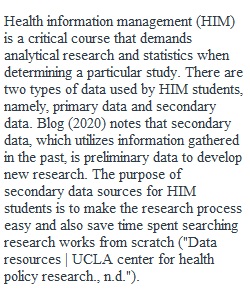


Q First, describe the purpose of secondary data sources. Then, check your state’s department of health website to educate yourself on which secondary data sources are in use at the state level. Determine whether your state has a state-wide cancer or immunization registry. If so, determine the source of the data included in the registries. Would you consider this data reliable and accurate? How would you make this determination? Then, find out what diseases are on the notifiable or reportable list for your state. Please cite your source! In order to be eligible to receive full credit for this forum, you must post an initial response AND respond to the post of one of your classmates prior to the close date for the forum. The initial post is worth up to 3 points and the reply is worth up to 2 points. Any questions concerning this lesson or the textbook material should be posted to the link titled Ask Questions About L6 Here. I actively monitor that forum for student questions. Please do not request quiz answers or clarification to quiz answers until AFTER the quiz has closed, and you have had a chance to review the correct answers. If, after you have seen the correct answers you still have questions, you may post them to the link titled Ask Questions About L6 Here.
View Related Questions